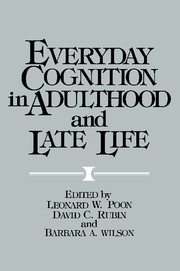Book contents
- Frontmatter
- Contents
- List of contributors
- Preface
- Part I Adult cognitive abilities in the laboratory and in real-life settings: Basic theoretical and methodological issues
- Part IA Systematic approaches to laboratory and real-world research
- Part IB Combining laboratory and real-world research
- Part II Cognition in adulthood and late life: Findings in real-life settings
- Part IIA Everyday cognitive abilities
- 11 Memory for prose: Perspectives on the reader
- 12 Prose processing in adulthood: The text, the reader, and the task
- 13 Speech comprehension and memory through adulthood: The roles of time and strategy
- 14 The effects of aging on perceived and generated memories
- 15 Aging and word retrieval: Naturalistic, clinical, and laboratory data
- 16 Acquisition and utilization of spatial information by elderly adults: Implications for day-to-day situations
- 17 Inner-city decay? Age changes in structure and process in recall of familiar topographical information
- 18 The cognitive ecology of problem solving
- 19 Everyday problem solving: Methodological issues, research findings, and a model
- 20 Prospective/intentional memory and aging: Memory as adaptive action
- Part IIB Concomitant influences
- Part III Cognitive enhancement and aging: Clinical and educational applications
- Part IIIA Issues and perspectives
- Part IIIB Enhancement approaches
- Part IIIC Designing programs for cognitive rehabilitation
- Subject index
- Author index
18 - The cognitive ecology of problem solving
Published online by Cambridge University Press: 05 October 2013
- Frontmatter
- Contents
- List of contributors
- Preface
- Part I Adult cognitive abilities in the laboratory and in real-life settings: Basic theoretical and methodological issues
- Part IA Systematic approaches to laboratory and real-world research
- Part IB Combining laboratory and real-world research
- Part II Cognition in adulthood and late life: Findings in real-life settings
- Part IIA Everyday cognitive abilities
- 11 Memory for prose: Perspectives on the reader
- 12 Prose processing in adulthood: The text, the reader, and the task
- 13 Speech comprehension and memory through adulthood: The roles of time and strategy
- 14 The effects of aging on perceived and generated memories
- 15 Aging and word retrieval: Naturalistic, clinical, and laboratory data
- 16 Acquisition and utilization of spatial information by elderly adults: Implications for day-to-day situations
- 17 Inner-city decay? Age changes in structure and process in recall of familiar topographical information
- 18 The cognitive ecology of problem solving
- 19 Everyday problem solving: Methodological issues, research findings, and a model
- 20 Prospective/intentional memory and aging: Memory as adaptive action
- Part IIB Concomitant influences
- Part III Cognitive enhancement and aging: Clinical and educational applications
- Part IIIA Issues and perspectives
- Part IIIB Enhancement approaches
- Part IIIC Designing programs for cognitive rehabilitation
- Subject index
- Author index
Summary
Discussions of perception or memory seldom begin by defining a percept or a memory. Discussions of problem solving, however, almost always begin by attempting to define a problem. Yet the term “problem” is in the everyday vocabulary of virtually every adult. When a term that is commonly used must be explicitly defined, usually it is because the meaning that is intended differs from the common usage. The difference may be connotative. For example, the term “relativity” has almost completely different connotations for the theoretical physicist and for the layperson. The difference may also be denotative. For example, the term “flu” denotes different sets of disorders for the epidemiologist and for the layperson. It seems unlikely that two concepts would denote the same things but have different connotations. It is likely, then, but not assured, that the scientific and the lay concepts of a problem denote different things. It is an open question whether or not the two concepts have similar connotations. If the connotations are similar, then we must ask if the problems we, as scientists, study are sufficiently similar to the problems people experience that we can generalize what we learn about how problems are solved and how to assist the process. If the connotations are not similar, the questions are more serious: If our problems are not like people's problems, to what aspect of human experience do they generalize? What fields of scientific inquiry do address problems that people experience?
- Type
- Chapter
- Information
- Everyday Cognition in Adulthood and Late Life , pp. 300 - 329Publisher: Cambridge University PressPrint publication year: 1989
- 18
- Cited by



